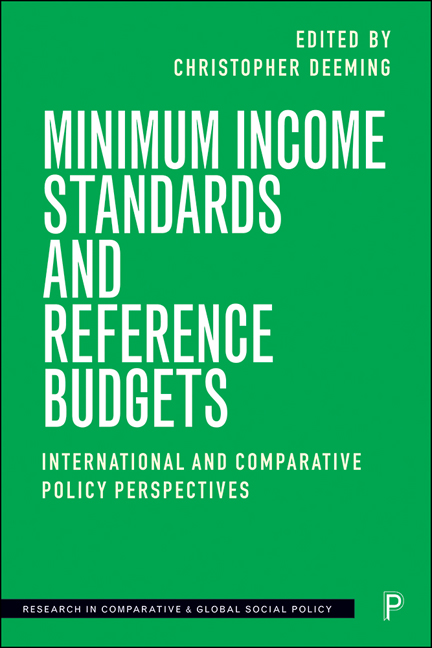2 - From Normative Budget Standards to Consensual Minimum Income Standards in the UK
Published online by Cambridge University Press: 12 March 2021
Summary
Rediscovering budget standards methods
In the early 1980s I became interested in expenditure data (Godfrey and Bradshaw, 1983). At the time I was directing the Social Policy Research Unit (SPRU) at the University of York and some of us in the unit were doing research on the impact of rapidly rising energy costs following the Yom Kippur War (Bradshaw and Harris, 1983). We were also doing work on social security (Deacon and Bradshaw, 1983) and were aware that the Thatcher government was introducing policies which would eventually lead to a more than doubling of child poverty during the decade. I was active in the Child Poverty Action Group (CPAG), chaired at the time by Peter Townsend. The Thatcher government had just replaced the Low-Income Statistics (LIS) series on poverty, based on the social assistance scales, with what would become the Households below Average Income series – still with us today – based on (now but not then) a 60 per cent median income threshold. This data was not having any impact on policy. A measure based on the proportion of households with incomes below 60 per cent of median equivalent income did not seem to resonate or move the public, although poverty was increasing rapidly.
We were in York, the City of Seebohm Rowntree, who had completed three very influential studies of poverty in the city based on budget standards published in 1901, 1941 and 1951 (Rowntree, 1901; Rowntree, 1941; Rowntree and Lavers, 1951). Rowntree advised Beveridge (1942) and the second survey results were available to him including the budget standard but, as Veit-Wilson (1992) has pointed out, the national insurance rates recommended by Beveridge were based on less eligibility with minimum subsistence assumptions. A budget standard was a specified basket of goods and services which, when priced, can represent a standard of living. Rowntree's budgets were designed to establish an income to meet basic minimum necessities. Beveridge's benefits aimed at minimum subsistence. But budgets could be devised to represent any living standard.
Budget standards methods had disappeared from living standards research in the UK in the postwar period (though David Piachaud (1979) published his Cost of a Child based on budget standards).
- Type
- Chapter
- Information
- Minimum Income Standards and Reference BudgetsInternational and Comparative Policy Perspectives, pp. 27 - 38Publisher: Bristol University PressPrint publication year: 2020



